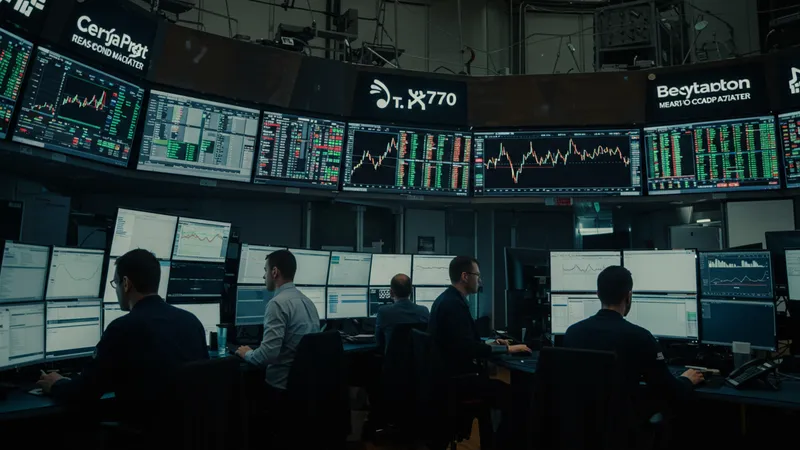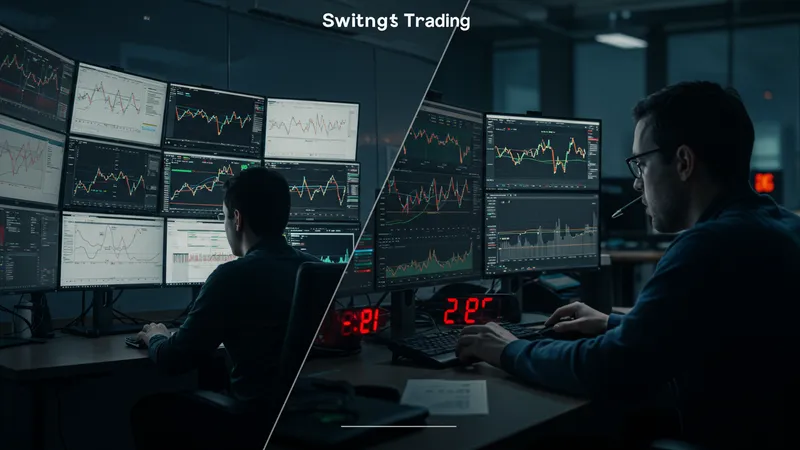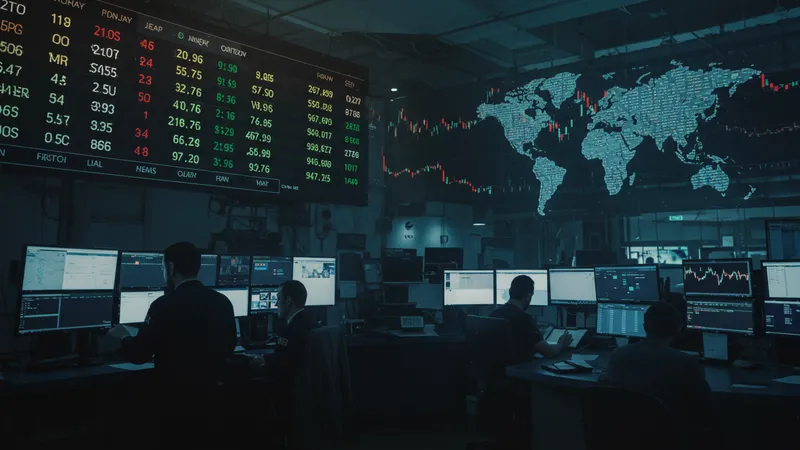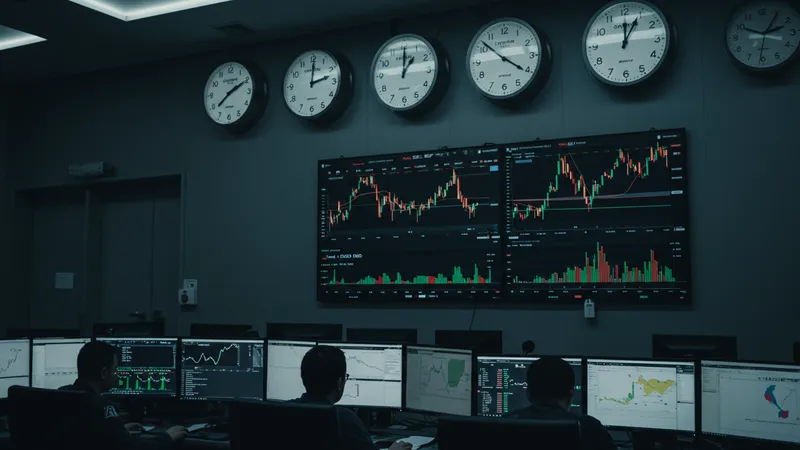


What if I told you that one trade could change your financial future forever? It sounds like the plot of a Wall Street thriller, but in the world of Forex trading, it's entirely possible.
With global economic shifts happening faster than ever, mastering Forex trading is a skill that could be your ticket to financial freedom. The stakes have never been higher.

In the world of Forex, success stories are not scarce but what makes one trader successful over another can be surprising. Many believe it all comes down to luck, but in reality, it's about strategy and psychology. You might think that a degree in finance is necessary, but the truth is, some of the most successful Forex traders didn't even finish high school. Many experts argue that the key to Forex mastery lies not in spreadsheets, but in understanding human behavior and market sentiment. But that’s not even the wildest part...
Picture this: You are trading alongside the world's most experienced financial minds, yet a novice with a keen sense for trends can outperform the lot. What makes this audacious notion plausible is the sheer volume and unpredictability of the Forex market. The dynamics here allow for unprecedented opportunities that traditional investments lack. Every move and risk carries both a thrilling potential and a cautionary tale. The intriguing part is, you don't even need to be rich to start. What happens next shocked even the experts...
Trading isn’t just about numbers; it’s about understanding human psychology. The emotions of fear and greed are drivers of market movement, and those who can master their own impulses often have a significant edge. The legendary Warren Buffett himself once said that successful trading was more about temperament than intellect. It’s the trader who acts rationally and calmly during times of market volatility that often sees the greatest success. But there's more than meets the eye...
Understanding crowd psychology can be your secret weapon. While the masses panic and sell, you learn to hold your position or even buy more. Research shows that over 70% of traders quit within the first two years because they can't manage their emotions. This is where tools like TradingView come into play, providing insightful metrics that help traders understand when to capitalize on market fear. Yet some nuances make even seasoned traders scratch their heads, so what you should know next might surprise you...
While many enter the Forex world focused on complex strategies, experienced traders advise starting with a focus on mindset. Patience and discipline are cited as the cornerstones of trading success. Cultivating these qualities can mean the difference between a momentary gamble and a strategic, wealth-growing plan. Imagine the possibilities of honing these skills; suddenly, the volatile FX world seems less daunting. But wait, because there's an unexpected twist that could change everything for you...
It might be hard to believe, but many successful Forex traders credit their breakthroughs to a single, simple change: keeping a trading journal. This practice transforms abstract thoughts into concrete strategies. By documenting trades, emotions, and decisions, patterns begin to emerge, illuminating the path to better decision-making. With each page, you're not just chronicling trades, but refining your trader's intuition. And trust me, what you’ll learn next might offer you a new perspective on the Forex world...
The modern trader has a wealth of tools at their disposal that didn't exist even a decade ago. Platforms like MetaTrader 4 are now the staple of many traders' arsenals, providing charts, indicators, and automated trading capabilities. Its popularity is so immense that nearly 90% of professional traders recommend it. However, the capabilities of these tools can only be fully realized with a sufficient understanding of their functions. Have you ever wondered, what's the hidden potential these tools can unlock?

The power of real-time analysis cannot be overstated. Using software like MetaTrader 4, traders access instantaneous data that allows for split-second decision-making. This speed and efficiency are what set today's trader apart from those of the past. Moreover, with broker-integrated features, transactions can be executed seamlessly, often with just a single click. Yet, despite its efficiency, there are aspects of these tools that keep even seasoned players on their toes. So, what hidden features should you be paying attention to?
The platforms we depend on today continue to evolve, ensuring that traders have the most robust tools at their fingertips. TradingView’s intricate charting capabilities allow for an in-depth market examination that was once only available to institutional investors. Notably, the platform's community of traders can provide insights that would be difficult to glean alone. Nevertheless, part of the brilliance in using such platforms lies in knowing when and how to apply them strategically. Ready to unlock a secret that seasoned traders already know?
While these tools can significantly enhance trading efficiency, they can also mislead if not used correctly. One of the common pitfalls is relying too heavily on technical indicators without factoring in market news and sentiment. However, if utilized wisely, these platforms can transform ordinary trading into an extraordinary experience. Dive deeper, and you might start to see connections where others see chaos. And what you’re about to discover might just be the most game-changing revelation yet...
The allure of Forex trading can sometimes overshadow its inherent risks. Stories of overnight fortunes capture attention, but the reality is mixed with tales of significant losses. According to statistics, nearly 90% of novice traders face losses when starting out. The secret lies not just in riding the successful trades, but also in managing the unsuccessful ones through smart risk management strategies. Yet, there are unknown dangers lurking that many overlook...

For many, the dream of financial independence can cloud judgment, leading to impulsive decisions. Leverage is a common trap; while it can magnify profits, it can just as easily amplify losses. Newcomers often fall into this trap, mistaking small capital requirements as a gateway to significant profit. Those who understand the balance of risk versus reward frequently emerge with stories of triumph. However, there are finer symptoms of risk that even experienced traders learn the hard way...
Furthermore, market manipulation can exist, sometimes operating in subtle and unexpected ways. Large financial institutions might influence market trends, creating a choppy trading environment. Misleading signals can tempt traders to make premature decisions. Yet, by staying informed and wary of such probabilities, traders can navigate these waters more effectively. Still, there's another layer of risk that's often unspoken, and it might just alter your trading approach forever...
And it comes down to the unsung hero of trading: the power of self-control. The greatest weapon against risk is the trader's ability to resist urges to overtrade or chase losses. Mastery over one's own instincts proves time and again to be the most underrated asset. As traders learn to embrace this skill, they often find themselves not just with increased resilience, but with a transformed outlook on trading risks. Prepare yourself, for what you learn next could redefine risk for you in ways you’ve never considered...
While there's no one-size-fits-all formula for success, known strategies enveloped in mystery often deliver compelling results. Swing trading, for one, capitalizes on market swings over days or weeks and has gained popularity for its balance between risk and reward. But within these known strategies lurks room for creativity and personalization that can enhance outcomes significantly. Yet, there is much more beneath the surface...

Scalping, on the other hand, lives in the quick beats of the market, where decisions are made every second. It requires precision akin to a finely-tuned instrument, and those adept in this strategy thrive on fractions, moments, and instincts. It’s here that some traders claim to find the most excitement. But scalping's speed and volatility are a double-edged sword, presenting both opportunity and risk. Curious about how you can safely approach this high stakes strategy?
For others, there lies comfort in day trading, where positions open and close within the same day. This strategy caters to those who can dedicate time and technical analysis to beat the market ride. It’s focused, energetic, and undeniably rewarding for those who get it just right. However, the volatility of each trading day can carry unexpected twists, keeping traders on their toes. Are you ready to explore the deeper nuances of this fast-paced world?
The art of Forex is not in playing the market but in understanding oneself in relation to it. The beauty lies in the journey and the personal strategy one builds along the way. Eventually, the best-made strategies are those uniquely handcrafted by the trader. Some secrets are inherited, others are discovered, and just one profound insight could change everything you've ever known about trading...
In the vast ocean of Forex, hidden opportunities shimmer like pearls waiting to be discovered. The slightest shift in financial headlines or geopolitical events can set the stage for lucrative trades. Those who remain alert and proactive can capture these moments. But it doesn’t end there...

Beyond the conventional currency pairs lies a realm of possibilities that many traders overlook. Exotic pairs, though volatile, can present significant gains. They demand a seasoned touch, understanding the delicate dance of global currencies beyond the familiar U.S. dollar, Euro, or Yen. This arena is peculiarly promising, if you know where to look. What could lie behind this veil of overlooked potential?
Even during periods of economic downturn, opportunities abound. It’s during these times that resourceful traders pivot, diversify, and often find gold amid seeming scarcity. For instance, take advantage of currency pair misalignments across different time zones to profit from market inefficiencies. There's a level of excitement in pinpointing disparities and converting them into trading advantages. Are you prepared to delve into these undercurrent opportunities?
As technology and market environments evolve, new instruments and trade possibilities continuously surface. Being attuned to these changes can result in substantial rewards. The evolving landscape calls for agility, keen observation, and a bit of courage to tread unknown paths. Perhaps what awaits you here—right in the next page—will change your trading game altogether...
The synergy between technology and trading is no longer a thing of science fiction novels. High-frequency trading, driven by algorithms, now rivals human decision-making capability. Software conducts trades in microseconds, a feat unimaginable a generation ago. However, technology’s influence spans beyond speed. What other wonders does it hold?

Think about artificial intelligence and machine learning, which are now industriously applied by savvy traders. These advancements churn through vast quantities of data, extracting actionable insights—an advantage unfathomed just decades back. AI can predict market shifts with a degree of accuracy that can turn novice predictions into professional forecasts. Can you imagine how this could revolutionize your trading approach?
Blockchain technology, too, has made its mark. Its promise of transparency and security invites new dimensions to currency trading. Ripple and similar technologies continue to reshape the concept of digital currency, offering faster settlements and reduced fraud. As these platforms evolve, the trader's toolkit broadens. What's the potential impact of these digital advancements on your own trading arsenal?
While the advantages are apparent, technology also brings about complexities that require astute understanding and a discerning touch. For the contemporary trader, managing both human intuition and machine insights not only sets them apart but defines their edge in the competitive trading sphere. What you find next might just seal your mastery of leveraging technology within Forex...
The myriad of economic indicators available today can bewilder even a seasoned trader. However, understanding their implications could potentially double your profits. Indicators like GDP, employment rates, and consumer sentiment indices play pivotal roles in currency value predictions. The intrigue lies not in their availability, but in their unpredictable impact on Forex markets. What else could be twisting these outcomes?

The Federal Reserve’s interest rate decisions are often seen as the milestone announcement of the month, affecting not only USD but economies worldwide. Each whisper or hint about potential rate moves can send ripples across the trading market. But what's the mysterious force behind these reactions that can sometimes mislead traders?
Similarly, inflation rates and fiscal policies shape the world of currency values. Behind every reported percentage lies a story of economic resilience or turmoil, crucial for shaping informed trading decisions. Historical patterns show consistency, yet sometimes, anomalies disrupt these trends, puzzling even the experts. What secret mix could afford you foresight in this chaotic dance of numbers and policies?
Despite the rich trove of data, the real talent lies in differentiating signal from noise, crafting strategies based on dynamic, sometimes contradictory pieces of information. Surprisingly, focusing on seemingly minor reports can also yield a goldmine of trade setups. Explore further to uncover historical secrets that could color your understanding of economic indicators like never before...
Choosing the right forex broker is often the first major decision a trader makes—and it can be a daunting one. This choice can influence trading costs, execution speed, and even the trader's overall experience. Many newcomers get swayed by promotional gimmicks and slick marketing—only to realize the hidden charges and subpar customer service they unwittingly signed up for. Ready to uncover the truth?

Regulation is paramount. Working with a broker regulated by reputable authorities like the FCA, NFA, or ASIC ensures a certain level of consumer protection. In contrast, many unregulated “bucket shops” pop up with irresistible offers but often vanish overnight, taking traders' investments with them. Meanwhile, broker transparency in fees and spreads can also avert many unpleasant surprises. How do you navigate these murky waters and ensure a reliable partnership?
User reviews and community feedback offer invaluable insights into the broker’s reliability. Forums and trading communities can often provide uncensored feedback on platform stability, withdrawal processes, and customer support efficiencies. A surprisingly large number of seasoned traders claim they discovered their brokers by word-of-mouth via trading networks rather than glossy advertisements. Yet, one more overlooked factor might tip the scales in your decision...
Consideration extends beyond mere cost-efficiency and safety. The range of platforms offered, the integration of cutting-edge tools, and the quality of educational resources often differentiate superior brokers from the mediocre. Tuning into the broker's commitment to trader education and ongoing support can be game-changing. The next revelation could guide you towards a choice that harmoniously aligns with both your strategy and aspirations in the Forex domain...
The ironclad truth is that Forex doesn't exist in a vacuum; it dances to the tune of global events. Financial crises, geopolitical tensions, and even pandemics exert considerable influence, often sending currencies in whirlwinds of unpredicted movements. Traders with a finger on the pulse of world events can exploit these fluctuations for profitable gains. Surprised? You might haven't considered the full scope yet...

War and conflict are among the foremost disruptors. The instant surge in oil prices amidst turmoil can boost currencies of oil-exporting nations. Conversely, those relying on imports feel fiscal strain, tanking the value of their currency. Every declaration, skirmish, or armistice echoes through Forex markets with a telling impact. But not all impacts are negative; more intriguing patterns reveal themselves beneath the surface...
Natural disasters present less predictable changes. While they might wreak havoc on local economies, the broader impact can sometimes result in currency booms due to reconstruction efforts and international aid. However, predicting such trends demands a robust understanding of global supply chains and economic interdependencies. Only those traders equipped with broader awareness recognize these nuances—and the rewards awaiting keen observers...
Changing political landscapes provide both unprecedented opportunities and challenges. Elections can drastically sway investor confidence, shifting currency strength. Think Brexit: a prime illustration of such rapid Forex market movements. Delving into these global triggers with surgical precision can make all the difference in positioning one's trades effectively. Uncover the tactics of traders who thrive amid such volatility and set a course for your next strategic move...
Currency pairs are the daily bread of Forex traders, yet understanding them goes beyond mere pairings. It’s about the interplay, how one currency's rise could spell the fall for another, and knowing which pairs to choose at the right time. This dual nature demands an appreciation of both micro and macroeconomic factors. But there’s more depth to this dynamic...

Major pairs like EUR/USD and USD/JPY are amenable to precise technical analysis, given their liquidity and vast trading volumes. However, they also face volatility from central bank policies and global economic climates. Understanding the subtleties of how these forces interact can make the difference between profit and loss. So what secrets lie beneath these well-trodden paths?
One captivating realm lies within minor and exotic pairs. Emerging markets and currencies from smaller economies encapsulate a wealth of untapped potential. While they might not command the same attention, their reactions to global events often defy expectations, offering unique trade setups. The unexpected benefits found here could be game-changing, but how do you harness them?
The concept of correlation further complicates and enhances trading strategies. Some currency pairs might move in tandem, while others inherently oppose. This knowledge aids in predicting movements across pairs, hedging risks, or capitalizing on complementary shifts. Digging deeper into these connections can unlock a richer trading landscape. Find out just how this breakthrough understanding could redefine your approach to currency pairs...
In the digital age, the solitary trader is a thing of the past. Connecting with Forex communities not only breaks the isolation but also opens the door to wealths of shared insights and experiences. Traders collaborate more than ever, sharing strategies, alerts, and even real-time reactions to market changes. Yet there’s a dimension of these interactions that remain underestimated...

Forums like ForexFactory and Reddit's r/Forex have become bustling hubs where traders dissect market behaviors and recent events. Here, raw, unfiltered discussions thrive, offering perspectives often left out of mainstream analysis. An exchange of this magnitude fosters a unique educational tie between novice and expert traders across the globe. But there’s another essential layer beneath these interactions...
Mentorship and peer accountability have sparked new paths of growth within these communities. Seasoned traders offer guidance and critique, transforming burgeoning traders into informed, tactical participants. The mentor/mentee dynamic provides unparalleled insights, as it combines theoretical knowledge with practical applications. This symbiotic relationship redefines peer learning in the Forex world. Just how transformational could this be for your trading journey?
The power of community manifests vibrantly during unprecedented market events. Here, the collective knowledge pool reacts and strategizes in real time, transforming uncertainties into opportunities. By participating in these timely discussions, traders can adapt strategies promptly, pressing ahead with informed confidence. Dive into the life-changing potential of shared knowledge and propel your trading strategies to unprecedented heights...
In the world of Forex trading, diversification echoes as a timeless mantra for seasoned traders. While focusing on one or two currency pairs might yield quick returns, spreading investments delivers stability. Diversification minimizes risks—like a safety net catching you when unexpected market dives occur. But how deep does this principle go in Forex?

Traders often employ geographical diversification by investing in pairs spread across different regions. This strategy insulates portfolios from localized economic or political strife, offering solace in global unpredictability. By balancing currencies from varying economies, traders stretch their risk across more resilient grounds. But have you considered the full extent of diversification?
Some traders extend beyond currencies, using other financial instruments like commodities and indices for a broader safety cushion. This multi-instrument approach enhances the odds of weathering market storms and captures diverse returns. A mind open to these expansive possibilities can turn looming threats into fleeting shadows. How can you best leverage this all-encompassing tactic for ultimate financial resilience?
And let’s not forget temporal diversification—spanning trades across various time frames. By not tying fortunes to a single market condition, traders harness opportunities when different conditions favor varying strategies. Imagine crafting a portfolio where peaks and troughs balance each other naturally. Learn how mastering the breadth of diversification could safeguard your trading future and deliver unprecedented success...
The Forex market is alive around the clock, gyrating with relentless activity. This 24/5 enterprise offers the allure of non-stop trading, with active sessions cycling through various world regions. Each session presents unique characteristics, risks, and opportunities. Dive deeper into this cyclical spectacle and unlock its potential...

The Tokyo session marks a tranquil start to the trading day, gentle but not without surprises. Here, traders can focus on exotic pairs, experiencing lower volatility compared to other sessions. But still, critical plays unfold during these quieter hours. What's the untold advantage hidden in the peaceful rhythm of early trading?
The London session represents the bustling heart of Forex, with high liquidity and expansive trading volume. Traders relish this period’s overlaps with Tokyo and New York, as increased volatility invites strategic aggression. But therein lies a concealed challenge that traders must navigate carefully. How do you seize the clamor while evading its traps?
The New York session, characterized by pivotal news releases, brings volatility spikes and strategic opportunities. Despite its unpredictable nature, it remains a favorite among seasoned traders. Shrewd players harness these movements to their advantage, yet the balance of profit versus risk requires finesse. Ready for insights into trading timing that could fundamentally shift your approach? Stay tuned...
Mastering Forex trading, we've journeyed from novices' dreams to expert tactics. The result? You've explored the markets' complexities like few dare to imagine, unveiling hidden opportunities and groundbreaking strategies.
Now, it's your time to leap. Share these insights, invite fellow traders into the adventure, or delve back to reiterate and refine your newfound knowledge. In the ever-changing realm of Forex, only one thing remains certain—the brilliance of your next strategic move. Let this be merely the beginning, and together, let's uncover more of what lies beyond the horizon.